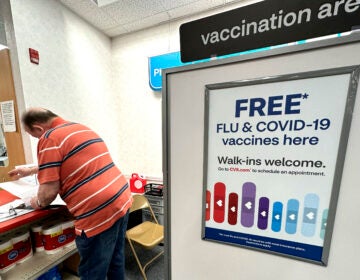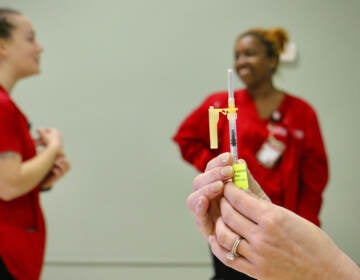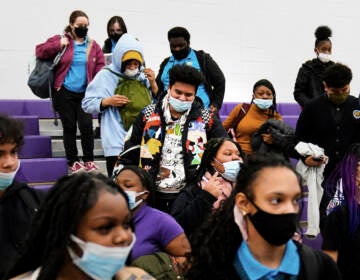N.J. sees ‘catastrophic’ surge in deaths, thousands more than official COVID tally
The surge in total deaths is far larger than those attributed to the coronavirus. Experts say it could take a while to reconcile the numbers.
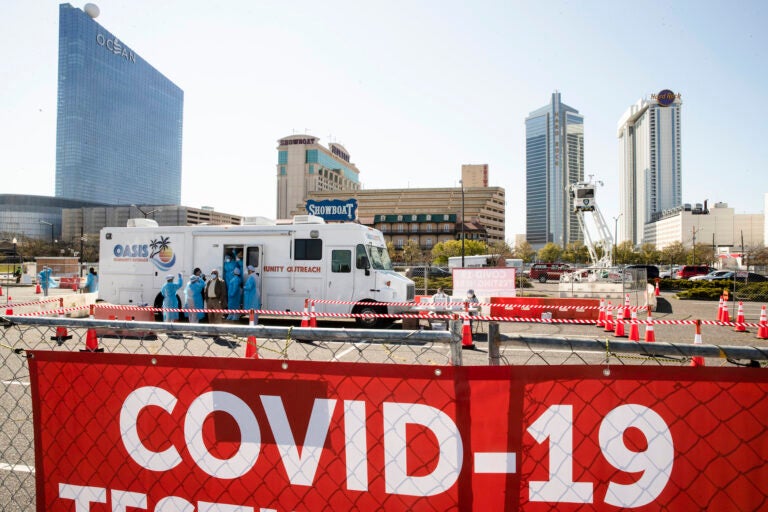
Medical workers prepare for the opening of a COVID-19 test location in a parking lot near the casinos in Atlantic City, Pa., Tuesday, April 28, 2020. (AP Photo/Matt Rourke)
New data released by the State of New Jersey suggests the true toll of COVID-19 may be much greater than previously thought.
Vital statistics released by the state show the total number of deaths by any cause between March and April rose from 12,567 last year to 23,070 this year. The 10,503 additional deaths recorded this year represent an 83% increase over 2019.
“This is just not something we have seen in American mortality data in a long time. It’s astonishing,” said Andrew Noymer, an epidemiologist at the University of California, Irvine. “This is unlike anything I have ever seen in the United States, short of the 1918 influenza pandemic.”
The 10,503 additional deaths recorded this year are 45% higher than the 7,228 coronavirus deaths the state officially recorded between March and April, which epidemiologists such as Noymer say is a sign that New Jersey is likely undercounting the true death toll from the pandemic.
Death trend lines tend to be very consistent year-to-year. Between 2016 and 2019, New Jersey never saw more than 13,047 deaths from all causes across March and April. That figure skyrocketed to more than 23,000 deaths this year.
“In New Jersey, the vast majority of deaths are directly related to COVID, in my opinion,” he said. “It’s a huge increase. It’s more than we’ve seen in any regular flu season, even the swine flu pandemic. It’s very significant.”
Noymer compared New Jersey’s latest vital statistics to other states that saw similar increases. States such as Pennsylvania have undercounted deaths due to recordkeeping issues, and one report found that Long Island, in New York, could be underestimating its coronavirus fatalities by more than 30%.
“Everyone’s kind of overwhelmed by this,” Noymer added. “Some deaths are going to be missed as COVID deaths.”
New Jersey officials explained that the spike in fatalities in March and April may also be linked to an uptick in deaths due to other causes.
“The New Jersey Department of Health has also seen increases in other deaths, such as hypertension and hypertensive renal disease, diabetes and chronic lower respiratory disease,” said spokeswoman Dawn Thomas. “The data is all preliminary, and over time we will learn more about the actual causes for these increases in deaths as more information is reported.”
Ed Lifshitz, medical director of the state Department of Health, also noted that it can be a while before the state receives the death certificates of people who die at home, so it may take officials longer to record cause of death in those cases.
State officials including Health Commissioner Judith Persichili have also noted that the number of people seeking care in New Jersey emergency rooms has dropped by about half, suggesting that many residents are skipping hospital visits out of fear they may contract the coronavirus and are leaving serious medical conditions untreated.
Beth Jarosz, senior research associate at the Population Reference Bureau, a nonprofit think tank, said COVID-19 deaths have sometimes been miscategorized.
“There are lots of reasons why the official count would be low. There isn’t enough testing. Even with testing, one of the things we’re learning is that COVID deaths may present in ways that dont look like COVID,” she said. “Younger people have had strokes, children can have skin rashes. Coroners are looking for respiratory deaths, but there’s an increase in deaths that no one was looking for.”
Still, Jarosz said that the overall surge in mortality in New Jersey — and across the country — is unlike anything most living residents have ever witnessed.
“It’s catastrophic. It’s as bad as some have feared it might be. Nothing is remotely similar,” she said. “If people hadn’t been convinced that staying home and wearing masks was important before, this might do it.”
WHYY’s Nicholas Pugliese contributed reporting.
WHYY is your source for fact-based, in-depth journalism and information. As a nonprofit organization, we rely on financial support from readers like you. Please give today.


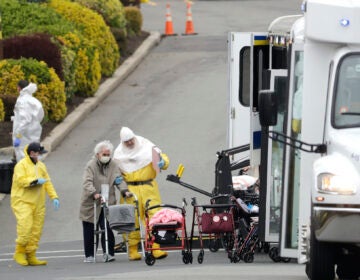
![CoronavirusPandemic_1024x512[1]](https://whyy.org/wp-content/uploads/2020/03/CoronavirusPandemic_1024x5121-300x150.jpg)
